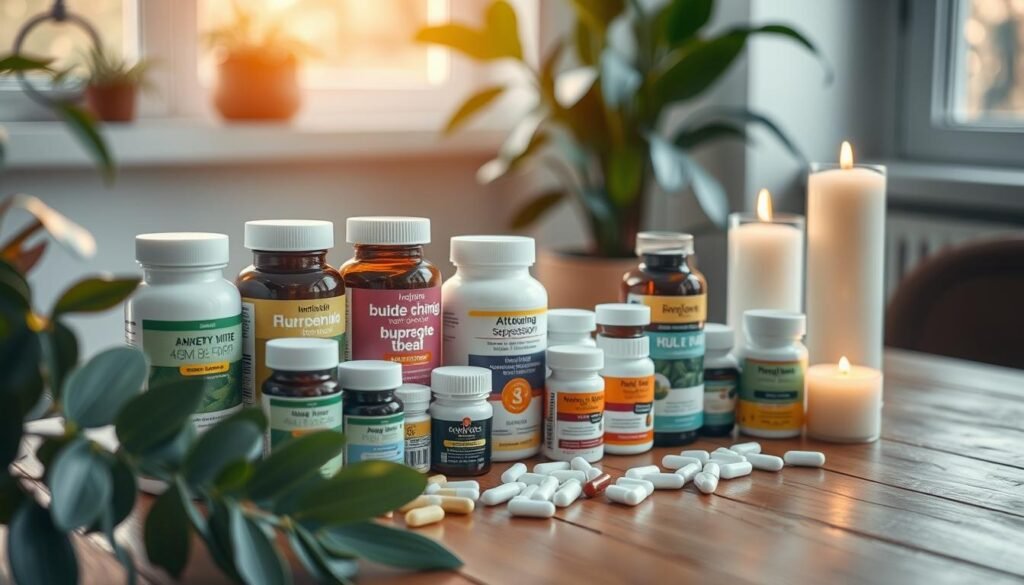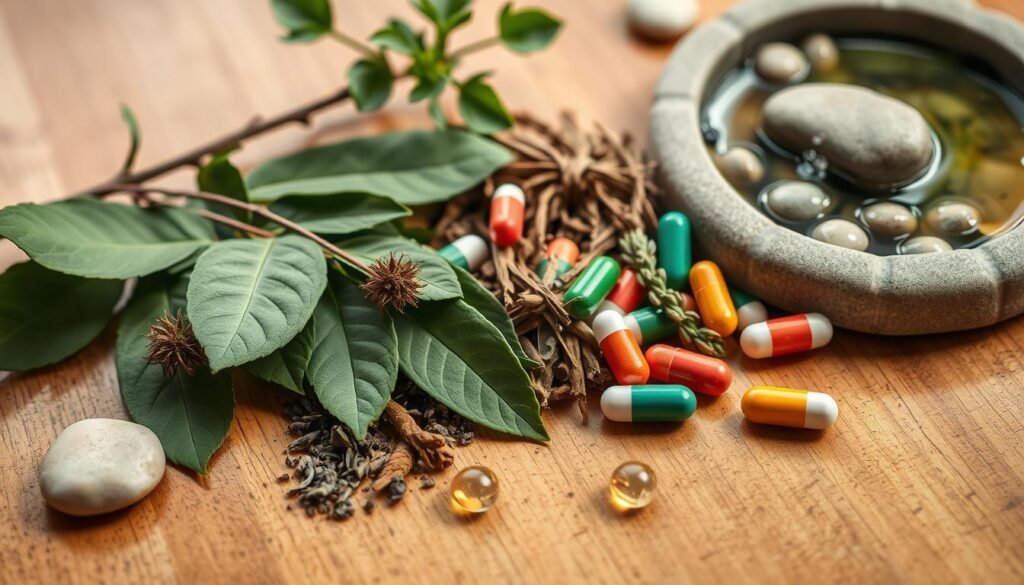Over 19% of Americans struggle with anxiety disorders. These are among the top mental health issues in the U.S. Some people use over-the-counter (OTC) medicines to help with symptoms of anxiety and depression. They find these remedies helpful, especially when they can’t get prescriptions or therapy right away. But remember, these OTC remedies should not replace professional help.
In this guide, we’ll look at the best OTC supplements for anxiety and depression. We’ll cover everything from herbal supplements like chamomile and lavender to key vitamins and minerals such as magnesium and omega-3 fatty acids. There are many helpful choices out there. Yet, talking to healthcare experts is key to ensure safety and effectiveness in improving mental health.
To understand more about managing anxiety and depression, check out various over-the-counter remedies. They can be a part of a broader treatment plan alongside professional therapy.
Key Takeaways
- Over 19% of the U.S. population faces anxiety disorders.
- OTC remedies can assist in managing anxiety and depression symptoms.
- Natural options like chamomile and magnesium may provide relief.
- Professional consultation is crucial before starting any new treatment.
- OTC options should not replace prescription medications or therapy.
Understanding Anxiety and Depression
Anxiety and depression affect many people’s lives. Knowing their signs and symptoms is the first step to getting better. There are treatments available, including medication for anxiety and natural ways to reduce depression and anxiety.
Defining Anxiety Disorders
Anxiety disorders make people worry a lot, feel restless, and have physical signs like a fast heartbeat and sweating. Around 40 million adults in the United States face anxiety disorders annually. Examples are Generalized Anxiety Disorder (GAD) and panic disorder. Finding help early can lead to successful treatments, helping people take back control of their lives.
Defining Depression
Depression makes people feel very sad, hopeless, and uninterested in daily life. The World Health Organization (WHO) says about 5% of adults worldwide face depression. Many people with depression also feel anxious. Almost half of those with major depression struggle with anxiety as well. There are important treatments available, like talking to a therapist and taking medicine.
| Condition | Common Symptoms | Treatment Options |
|---|---|---|
| Anxiety Disorders | Worry, restlessness, rapid heartbeat | SSRIs, SNRIs, Benzodiazepines |
| Depression | Sadness, hopelessness, loss of interest | SSRIs, psychotherapy, natural remedies |
Understanding these conditions is a key step towards finding the right treatment. This includes combining usual therapy with natural remedies for depression and anxiety.
The Connection Between Anxiety and Depression
Anxiety and depression often come together. This makes their relationship complex. They can make each other worse, leading to stronger symptoms in people. Understanding this link is key for early detection and treatment. Knowing the common signs of both conditions helps with quick action and getting the right over-the-counter treatments for anxiety and depression.
How They Affect Each Other
People with Generalized Anxiety Disorder (GAD) usually have symptoms of Major Depressive Disorder (MDD) too. Research shows that about 62% of those with GAD might get MDD in their lifetime. And 59% have had an MDD episode in the past year. Anxiety can make depression feel more intense, making someone feel trapped and without hope. Meanwhile, despair can make anxiety worse, creating a tough cycle. Spotting these patterns can improve treatment and encourage those struggling to get the help they need.
Common Symptoms to Look Out For
It’s crucial to recognize the common signs of anxiety and depression for mental health. Key symptoms are:
- Irritability
- Fatigue and low energy
- Difficulty concentrating
- Changes in sleep patterns
- Changes in appetite
These symptoms can appear differently in everyone and vary in strength. It’s important to know that these signs could mean anxiety, depression, or both. Dealing with these issues through the right over-the-counter treatments can help achieve a stable mood and better well-being.
| Symptom | Anxiety | Depression |
|---|---|---|
| Irritability | Common | Common |
| Fatigue | Common | Very Common |
| Difficulty Concentrating | Very Common | Common |
| Sleep Disturbances | Common | Very Common |
| Changes in Appetite | Uncommon | Common |
Importance of Professional Help for Anxiety and Depression
People with anxiety and depression need effective ways to deal with their symptoms. Getting professional help is key to overcoming these mental health challenges. Through therapy, many have found significant benefits, receiving personalized support based on their needs. Professionals offer a safe space for individuals to discuss their feelings and find root causes of their mental health issues.
Why Therapy is Essential
Therapy is a major way to deal with anxiety and depression. Cognitive Behavioral Therapy (CBT) teaches coping skills to tackle anxiety and boost mental health. Mindfulness and psychodynamic psychotherapy help understand emotions and grow personally.
Studies show many people find therapy helpful. It provides structured support for both immediate and long-term emotional wellness. The value of professional assistance is huge, offering practical tools and resilience.
While quick fixes might seem helpful, they usually just cover up symptoms. Therapy goes deeper, helping individuals understand their feelings and actions. This deep understanding builds coping skills and a sense of control over future issues.

| Therapeutic Approach | Focus | Benefits |
|---|---|---|
| Cognitive Behavioral Therapy (CBT) | Changing negative thought patterns | Improves overall emotional response |
| Mindfulness-Based Therapy | Present moment awareness | Reduces stress and anxiety levels |
| Psychodynamic Psychotherapy | Exploring unconscious thoughts | Identifies and resolves deep-seated issues |
Professional help is crucial in dealing with anxiety and depression. Therapy offers insights and tools for healing and thriving in everyday life.
Best OTC Medicine for Anxiety and Depression
Looking for OTC remedies for anxiety and depression can be hard. Many want alternatives to prescription medication because of side effects or the need for easier options. It’s vital to know about safe OTC pills for managing anxiety and depression symptoms.
Evaluating Over-the-Counter Options
Many consider over-the-counter options as their first defense against anxiety and depression. Even though the FDA hasn’t approved any OTC medications for anxiety, some supplements may help:
- Magnesium: Needed for mood balance, with adults advised to take 400-600 milligrams daily. Studies show it can also help you sleep better.
- L-theanine: This amino acid, found in green tea, improves sleep and brain function, offering hope for anxiety sufferers.
- Omega-3 fatty acids: Found in fish oil supplements, these acids can ease anxiety symptoms and may help with depression.
- Herbal supplements: Chamomile and valerian are used for their calming effects, with research looking into their benefits.
Common OTC Remedies and Their Benefits
Some OTC remedies stand out for those seeking relief:
| Supplement | Benefits |
|---|---|
| Magnesium | Improves sleep, supports mood balance |
| L-theanine | Enhances sleep quality and cognitive performance |
| Omega-3 Fatty Acids | Reduces anxiety symptoms, may act as an antidepressant |
| Chamomile | Calming effects, potential to reduce anxiety |
| Valerian | Improves sleep quality and may alleviate anxiety |
While OTC remedies can be helpful, it’s important to choose wisely. Talk to a healthcare provider to avoid any problems with other medications or health issues. For more advice on dealing with anxiety, here is a guide to seeking professional help.

Natural Remedies for Anxiety and Depression
Many people seek natural remedies for anxiety and depression. Herbal supplements and certain vitamins can offer significant help. They play a crucial role in emotional health.
Herbal Supplements with Therapeutic Benefits
Some herbal supplements have become popular for their calming effects. Here are a few notable ones:
- Ashwagandha: Known for its adaptogenic qualities, it might help lessen stress and anxiety.
- Chamomile: Studies show chamomile can help with symptoms of generalized anxiety disorder, especially as an extract.
- Lavender: Lavender’s aroma has been found to reduce anxiety, especially during stressful times like operations.
Key Vitamins and Minerals
Vitamins and minerals are vital in tackling anxiety and depression. By adding them through diet or supplements, we can improve our mood:
- Omega-3 Fatty Acids: Research shows that omega-3 can greatly lessen anxiety symptoms.
- Vitamin B6: Vitamin B6 is known to ease anxiety, especially when linked to PMS.
- Magnesium: Magnesium has been linked with lowering mild anxiety and reducing stress levels.
Learning about herbal and vitamin remedies for anxiety and depression is empowering. For more on managing anxiety, check out this resource.

OTC Anxiety and Depression Treatments: What’s Available
Many people search for relief from anxiety and depression with over-the-counter (OTC) treatments. These options include medications and supplements that may help. Understanding the choices and safety is vital.
Popular OTC Medications
For anxiety, common OTC options might be antihistamines like hydroxyzine and herbal remedies. Anxiety and depression OTC treatments can ease mild symptoms. Supplements like magnesium, omega-3s, L-theanine, and others support mental health.
Magnesium can lessen mild anxiety. L-theanine helps relax without making you sleepy. Lavender is good for sleep and easing anxiety.
Safety and Effectiveness of OTC Options
The safety of OTC meds is a big worry for buyers. Experts advise talking to doctors before starting any new supplement. This is specially true if you’re already taking other meds. While some find OTC remedies helpful, they don’t work for everyone. Care is needed, as more studies are needed to prove their full effects.
In conclusion, OTC treatments for anxiety and depression have potential. But paying attention to their safety is key. Talking to healthcare pros helps make wise choices. This considers the benefits and limits of these remedies.
Understanding the Role of Herbal Supplements for Anxiety
Herbal supplements like ashwagandha and lavender have become popular for easing anxiety. They have been studied a lot. These studies show they help people feel less anxious.
Top Herbal Options: Ashwagandha and Lavender
Ashwagandha is known to help your body handle stress better. A study in 2019 found that taking 600 mg each day for 10 weeks made people feel less anxious and sleep better. Lavender smells nice and helps calm you down. Studies have found that it, along with lemon balm, reduces anxiety and depression in people over a month.
Dosage and Usage Considerations
It’s important to talk to a doctor about how much ashwagandha to take. Supplements cost between $0.13 to $0.67 each. You should also check for side effects or how they mix with other drugs. A doctor can give advice on how to safely use these supplements.
| Herb | Potential Benefits | Common Dosage |
|---|---|---|
| Ashwagandha | Reduces stress and anxiety levels | 600 mg daily |
| Lavender | Promotes relaxation and improves sleep quality | Varies; consult healthcare providers |
Ashwagandha and lavender are great for relieving anxiety. They are effective and safe when used correctly. Always get advice from healthcare experts to use them best.
For more information on using herbs for anxiety, check out this detailed guide.
Considerations When Choosing OTC Supplements
Before diving into over-the-counter (OTC) supplements for anxiety and depression, know the risks. Talk with healthcare providers before you start anything new. This is especially important if you are already taking other medicines. Chatting about your health history and current meds helps pinpoint drug interactions with OTC supplements.
Consulting with Healthcare Providers
Talking to healthcare providers is key. They guide you on which supplements are safe and effective for you. This is crucial if you have specific health issues or are on certain medications. By having this conversation, you make sure the supplements won’t harm you. They might even make your treatments work better.
Interaction with Other Medications
OTC supplements and prescription meds don’t always mix well. For example, some herbs could mess with your anxiety pills, making them less effective or too strong. Here’s a table that lists common interactions and their effects:
| OTC Supplement | Possible Interaction | Effect |
|---|---|---|
| St. John’s Wort | Antidepressants | May reduce effectiveness of antidepressants |
| Ginkgo Biloba | Blood thinners | Increased bleeding risk |
| Valerian Root | Sedatives | Increased sedation |
| Kava | Anti-anxiety medications | Heightened effects of sedation |
Traditional Treatments as Complementary Options
It’s important to look at traditional treatments along with over-the-counter options for anxiety and depression. Medicines like SSRIs are often used because they work well in controlling symptoms. They adjust the brain’s chemistry, helping those with mental health issues feel better.
Prescription Medications Overview
SSRIs, combined with therapy, can improve treatment effectiveness for many. Studies show that using both methods together works better for reducing anxiety and depression than either alone. People can also include over-the-counter options like herbal supplements in their treatment. This leads to a personalized plan with options like magnesium and Omega-3 fatty acids, offering a fuller approach to treatment.
Combining Therapy with OTC Remedies
Mixing therapy with OTC remedies can enhance results. Herbal supplements such as ashwagandha and lavender show promise in easing stress and anxiety. Adding regular exercise and mindfulness can also boost mental health. By consulting healthcare providers, individuals can craft a treatment plan that mixes medications, therapy, and OTC options. This approach aims for a healthier, more balanced lifestyle.